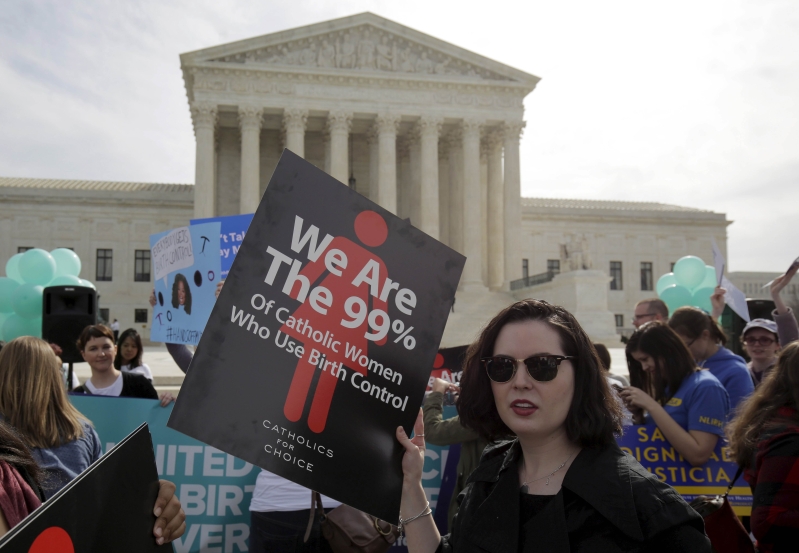
The U.S. Supreme Court on Monday threw out lower-court rulings that had required Christian employers to comply with a mandate in President Barack Obama's healthcare law to provide female workers insurance covering birth control, but ducked a major ruling on the merits of the case.
The court's unanimous action represented at least a short-term victory for the nonprofit employers, primarily Roman Catholic organizations, because it tossed out rulings in seven different cases that had endorsed the contraception mandate. The decision forces the lower courts to reconsider the dispute.
"The court expresses no view on the merits of the cases. In particular, the court does not decide whether petitioners' religious exercise has been substantially burdened," the unsigned ruling stated.
In a separate order, the court also sent six other cases on the same issue back to lower courts.
The compromise decision indicated that the court, which is evenly divided with four conservative justices and four liberals following the death of conservative Justice Antonin Scalia in February, wanted to avoid a 4-4 split in the case. Such a decision would have affirmed the lower-court rulings that favored the administration but would not have provided a decision to be applied nationwide.
Mark Rienzi, a lawyer for the Little Sisters of the Poor, an order of Roman Catholic nuns that filed suit against the Obama administration, said he was "very encouraged by the court's decision, which is an important win for the Little Sisters."
The justices in previous decisions since 2012 had fended off other major conservative challenges to the Obamacare law, considered President Barack Obama's signature domestic policy achievement.
The dispute before the justices involved seven consolidated cases focusing on whether nonprofit entities that oppose the contraception mandate on religious grounds can object under a 1993 U.S. law called the Religious Freedom Restoration Act to a compromise measure offered by the government.
The justices declined to decide whether the accommodation crafted by the Obama administration in 2013 to ensure that the employees receive contraception coverage violates their employer's religious rights.
The decision was announced by Chief Justice John Roberts. The court said it was opting against ruling on the merits in part because of "the gravity of the dispute and the substantial clarification and refinement in the positions of the parties" in recent weeks.
Justice Sonia Sotomayor, joined by Justice Ruth Bader Ginsburg, wrote a concurring opinion stressing the narrow nature of the decision. Lower courts should not view the ruling "as signals of where this court stands," she wrote.
After the oral argument in the case on March 23, it appeared the court could split 4-4, with liberals backing the government and conservatives supporting the challengers.
In an unusual move six days after the oral argument, the court asked both sides to file additional briefs outlining possible compromises, indicating the justices were motivated to avoid a deadlock.
"We are disappointed that the court did not resolve once and for all whether the religious beliefs of religiously affiliated non-profit employers can block women's seamless access to birth control," said Gretchen Borchelt, vice president for reproductive rights and health at the National Women's Law Center.






